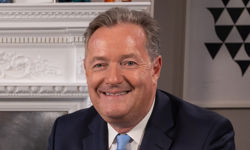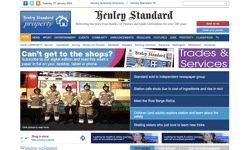“The Press lives by disclosure. And so, as an industry, we can't complain when caught in the headlights of public scrutiny. Nor do we. It is healthy, and we welcome it.
Indeed, in a particularly onerous year for searching examinations of press self regulation, the beam has not been shone solely externally - via a lengthy inquiry by the Culture Media and Sport Select Committee - but also from within.
As well as the Code Committee's annual review of the Code of Practice, a Governance Review panel has been looking at the work of the Press Complaints Commission - both processes in which the public was encouraged to engage.
We learn a lot from the public and other responses to such exercises. Much of it is constructive and helpful. But, alarmingly, many of the submissions expose a huge ignorance about how self-regulation works - often from those who should know better, in Parliament, in self-appointed media accountability groups and, more generally, in the blogosphere.
Myths abound and occasionally prejudice, too. Many mindsets remain firmly locked. Our mission is not just to improve the Code and the system of self-regulation, but to transform people's understanding - or misunderstanding - of how it works.
For example, a doctor wrote to the Code Committee with a potential remedy for what he saw, quite sincerely, as the ills of Press self-regulation. He wondered politely if it might be a good idea if the PCC recruited lay members on to its adjudicating panel, as does the General Medical Council. When we explained that PCC lay commissioners outnumbered editors by ten to seven, he was genuinely surprised; not least, perhaps, because the GMC has only 50% lay membership.
But the myth persists that the Press is the sole judge in its own court and that editors sit in on hearings about their own or sister newspapers. They don't. They leave the room and take no part.
Another fable is that the Code Committee Chairman also runs the PCC. In fact, the Code Committee is an industry body that writes, reviews and revises the Code, which the PCC - as an entirely separate and independent entity within the self-regulatory system, with its own eminent Chairman - administers. As Code Committee Chairman, I have no role in the PCC or its deliberations, nor would I wish to have. But I remain more committed than ever to the belief that if Britain's magazine and newspaper editors are to be locked into self-regulation, both in spirit and practice, then they must set their own code. The shame of censure by their peers is far greater for editors than that resulting from any penalty imposed by an outside body - which most papers would devote considerable ingenuity into trying to circumvent. Regarding the Commission, it is worth pointing out that the lay representation within the UK press system is the highest of any European press council. But then, the Editors' Code itself is widely copied internationally and a European Commissioner has praised The Editors' Codebook, which acts as a public guide to how the system works in practice, as a leading exemplar of its kind.
As for the Select Committee, its report itself made some very positive and useful points, especially in relation to defamation law and legal costs, but it didn't do itself justice by suggesting that newspapers guilty of breaching the Code should be suspended for a day and that fines should be imposed. The first suggestion would bring joy to Robert Mugabe. The second would have Messrs Sue, Grabbit and Runne rubbing their greedy hands with glee. It cannot be said too often that the imposition of sizable fines would result in complainants and particularly the press having to use lawyers to defend their interests - signalling the death of a FREE fast system of complaints adjudication.
As I've noted, many of the submissions to the Code Review, to the PCC Governance Panel or indeed, some parts of the Select Committee's Report sadly perpetuate opinions founded more in prejudice and preconception than fact.
The sadness is that much of this criticism simply misses the point, for it is an ineluctable truth that many provincial newspapers and some nationals are now in a near-terminal economic condition.
If our critics spent as much zeal trying to help reverse this tragic situation and work out how good journalism - which is, by its nature, expensive - is going to survive financially in an internet age, then democracy and the public's right to know would be much better served.
Certainly, the critics of self-regulation are entitled to expect more of us and we must continue to develop the Code and explain better how it works. But, by the same test, we are also entitled to expect more of many of our detractors in Parliament and in these self-appointed media accountability groups.
They will probably never concede the truth, which is that the PCC has over the years been a great success story. Britain's newspapers are infinitely better behaved than they were two decades ago. Yes, the industry can do more to improve standards. We will rise to our challenge. If our critics will rise to theirs, today's often-corrosive debate could become instead tomorrow's constructive way forward.
Three changes to clarify and strengthen the Code were introduced in 2009, covering Privacy, Harassment and the Public Interest.
The Privacy Clause (3) was expanded to make clear that the PCC will take into account relevant previous disclosures by the complainant, which codifies the Commission's existing practice.
The Harassment Clause (4) introduced a requirement for journalists in situations where harassment could become an issue to identify themselves, if requested to do so. This followed an external submission to the Code Review, which accorded with most current custom and practice.
The Public Interest exceptions were amended so that the test would be whether the editor had a reasonable belief at the time that his or her action was in the public interest. This modification, taken in accordance with recent legal developments, means editors must now demonstrate that they had good reason to believe their intrusion was justified. We believe these changes will further consolidate existing good practice into the Code.
Finally, the Code Committee has undergone a sea change in the last 12 months. Six members stepped down, some after many years' service. They were: Adrian Faber, of the Express and Star, Wolverhampton; Mike Gilson, then of The Scotsman; Doug Melloy, of the Rotherham and South Yorkshire Advertiser; David Pollington of the Sunday Post; Alan Rusbridger, of The Guardian, and Neil Wallis, of the News of the World. I thank them all for their commitment and wisdom, which has been invaluable.
We welcomed in their place: Damian Bates, Evening Express, Aberdeen (Scottish Newspaper Society); Colin Grant, Iliffe News and Media East (Newspaper Society); Geordie Greig, Evening Standard (Newspaper Publishers Association); Mike Sassi, Staffordshire Sentinel News and Media (NS); Hannah Walker, South London Press (NS); and Richard Wallace, Daily Mirror (NPA). They join Neil Benson, Trinity Mirror Regional Newspapers (Newspaper Society); Jonathan Grun, Press Association (NPA); Ian Murray, Southern Evening Echo (NS); June Smith-Sheppard, Pick Me Up magazine (Periodical Publishers Association); Harriet Wilson, Conde-Nast Publications (PPA); and John Witherow, Sunday Times (NPA).
It is a team of great experience in every reach of print journalism and I'm very pleased to have them on board to help face the many challenges ahead.”










